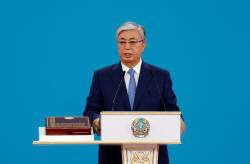|
Mobile phone operators in the oil-rich Central Asian nation's
capital, Nur-Sultan, had asked customers to install an
encryption certificate on their devices or risk losing internet
access.
State security officials said its goal was to protect Kazakh
users from "hacker attacks, online fraud and other kinds of
cyber threats".
The certificate allowed users' traffic to be intercepted by the
government, circumventing encryption used by email and messaging
applications.
Several Kazakh lawyers said this week they had sued the
country's three mobile operators, arguing that restricting
internet access to those who refused to install the certificate
would be illegal.
But late on Tuesday, Kazakhstan's State Security Committee said
in a statement that the certificate rollout was simply a test
which has now been completed. Users can remove the certificate
and use internet as usual, it said.
Kazakh President Kassym-Jomart Tokayev said in a tweet he had
personally ordered the test which showed that protective
measures "would not inconvenience Kazakh internet users".
"There are no grounds for concerns," he said.
Even before the roll out of the certificate, the former Soviet
republic routinely blocked access - usually for periods of a few
hours - to some popular websites and applications including
Facebook, YouTube, and messaging services WhatsApp and Telegram.
The blocks have usually coincided with live broadcasts by
government critics and public protests, the most recent wave of
which took place during and after the June 9 election which made
Tokayev, previously an interim leader, the full-time president.
(Reporting by Olzhas Auyezov; Editing by Alison Williams)
[© 2019 Thomson Reuters. All rights
reserved.] Copyright 2019 Reuters. All rights reserved. This material may not be published,
broadcast, rewritten or redistributed.
Thompson Reuters is solely responsible for this content.

|
|





